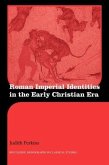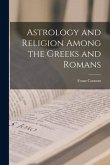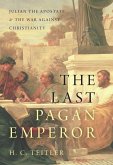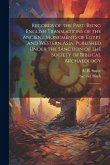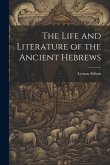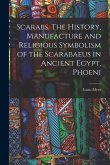Confronting Identities in the Roman Empire
Assumptions about the Other in Literary Evidence
Herausgeber: Brandão, José Luís; Rodrigues, Ália; Teixeira, Cláudia
Confronting Identities in the Roman Empire
Assumptions about the Other in Literary Evidence
Herausgeber: Brandão, José Luís; Rodrigues, Ália; Teixeira, Cláudia
- Broschiertes Buch
- Merkliste
- Auf die Merkliste
- Bewerten Bewerten
- Teilen
- Produkt teilen
- Produkterinnerung
- Produkterinnerung
"This open access edited volume offers an understanding of how ancient texts, ranging from the historical and biographical to the oratorical and epistolary, demonstrate the negotiation and renegotiation of the concepts of otherness, identity and culture. Drawing together new research from emerging and senior scholars from across the world, this book presents an up-to-date insight into notions of identity and otherness, both at the level of the individual and community, in the ancient world. The ebook editions of this book are available open access under a CC BY-NC-ND 4.0 licence on…mehr
Andere Kunden interessierten sich auch für
![Roman Imperial Identities in the Early Christian Era Roman Imperial Identities in the Early Christian Era]() Judith PerkinsRoman Imperial Identities in the Early Christian Era57,99 €
Judith PerkinsRoman Imperial Identities in the Early Christian Era57,99 €![Sator Enigma Sator Enigma]() John T CullenSator Enigma13,99 €
John T CullenSator Enigma13,99 €![Astrology and Religion Among the Greeks and Romans Astrology and Religion Among the Greeks and Romans]() Franz CumontAstrology and Religion Among the Greeks and Romans19,99 €
Franz CumontAstrology and Religion Among the Greeks and Romans19,99 €![The Last Pagan Emperor The Last Pagan Emperor]() H C TeitlerThe Last Pagan Emperor28,99 €
H C TeitlerThe Last Pagan Emperor28,99 €![Records of the Past: Being English Translations of the Ancient Monuments of Egypt and Western Asia, Published Under the Sanction of the Soc Records of the Past: Being English Translations of the Ancient Monuments of Egypt and Western Asia, Published Under the Sanction of the Soc]() Samuel BirchRecords of the Past: Being English Translations of the Ancient Monuments of Egypt and Western Asia, Published Under the Sanction of the Soc22,99 €
Samuel BirchRecords of the Past: Being English Translations of the Ancient Monuments of Egypt and Western Asia, Published Under the Sanction of the Soc22,99 €![The Life and Literature of the Ancient Hebrews The Life and Literature of the Ancient Hebrews]() Lyman AbbottThe Life and Literature of the Ancient Hebrews29,99 €
Lyman AbbottThe Life and Literature of the Ancient Hebrews29,99 €![Scarabs. The History, Manufacture and Religious Symbolism of the Scarabaeus in Ancient Egypt, Phoeni Scarabs. The History, Manufacture and Religious Symbolism of the Scarabaeus in Ancient Egypt, Phoeni]() Isaac MyerScarabs. The History, Manufacture and Religious Symbolism of the Scarabaeus in Ancient Egypt, Phoeni24,99 €
Isaac MyerScarabs. The History, Manufacture and Religious Symbolism of the Scarabaeus in Ancient Egypt, Phoeni24,99 €-
"This open access edited volume offers an understanding of how ancient texts, ranging from the historical and biographical to the oratorical and epistolary, demonstrate the negotiation and renegotiation of the concepts of otherness, identity and culture. Drawing together new research from emerging and senior scholars from across the world, this book presents an up-to-date insight into notions of identity and otherness, both at the level of the individual and community, in the ancient world. The ebook editions of this book are available open access under a CC BY-NC-ND 4.0 licence on bloomsburycollections.com. Open access was funded by FCT - Foundation for Science and Technology, I.P., under the project Rome our Home: (Auto)biographical Tradition and the Shaping of Identity(ies) (PTDC/LLT-OUT/28431/2017)"--
Hinweis: Dieser Artikel kann nur an eine deutsche Lieferadresse ausgeliefert werden.
Hinweis: Dieser Artikel kann nur an eine deutsche Lieferadresse ausgeliefert werden.
Produktdetails
- Produktdetails
- Verlag: Taylor & Francis Ltd (Sales)
- Seitenzahl: 384
- Erscheinungstermin: 26. Juni 2025
- Englisch
- Abmessung: 234mm x 156mm x 25mm
- Gewicht: 454g
- ISBN-13: 9781350354012
- ISBN-10: 1350354015
- Artikelnr.: 71244968
- Herstellerkennzeichnung
- Libri GmbH
- Europaallee 1
- 36244 Bad Hersfeld
- gpsr@libri.de
- Verlag: Taylor & Francis Ltd (Sales)
- Seitenzahl: 384
- Erscheinungstermin: 26. Juni 2025
- Englisch
- Abmessung: 234mm x 156mm x 25mm
- Gewicht: 454g
- ISBN-13: 9781350354012
- ISBN-10: 1350354015
- Artikelnr.: 71244968
- Herstellerkennzeichnung
- Libri GmbH
- Europaallee 1
- 36244 Bad Hersfeld
- gpsr@libri.de
José Luís Brandão is Associate Professor in Classic Studies at the University of Coimbra, Portugal, and Researcher at the Centre for Classic and Humanistic Studies (CECH) and PI of the BioRom Project (2018-22). Cláudia Teixeira is Associate Professor of Literature at the University of Évora, Portugal, and Researcher at the Centre for Classic and Humanistic Studies (CECH), University of Coimbra and co-PI of the BioRom Project (2018-22). Ália Rodrigues is Researcher at the Centre for Classic and Humanistic Studies (CECH), University of Coimbra, Portugal and Postdoctoral Fellow of the BioRom Project (2018-21).
Introduction: José Luís Lopes Brandão (University of Coimbra, Portugal),
Cláudia Teixeira (University of Évora, Portugal) and Ália Rodrigues
(University of Coimbra, Portugal) Part I: Confronting Identities: Othering
Communities and Groups 1. Performing Identities in Rome's Western Provinces
Louise Revell (University of Southampton, UK) 2. Decolor Heres: Dark Skin
in the Roman Cultural Imagination Mario Lentano (University of Siena,
Italy) 3. Cicero on Foreign Religious Images and Practices Claudia Beltrão
(Federal University of Rio de Janeiro, Brazil) 4. Where Reason Could Not
Prevail: Barbarian Othering and Diplomatic Double-Standards Caesar's
Commentarii De Bello Gallico Ralph Moore (Trinity College Dublin, Ireland)
5. Non Idem Esse Romani et Graeci: Varro's De Re Rustica and the
Integration of the Roman World Selena Ross (Rutgers University, USA) 6.
Pirate Alterity in Plutarch. The Roman Influence on the Construction of the
Autre Pirate in the Moralia Francisco Martínez (University of Sevilla,
Spain) 7. Contra mores maiorum: Barbarian Women Prisoners During the
Principate and the High Empire Denis Álvarez Pérez-Sostoa (University of
The Basque Country, Spain) 8. Dio of Prusa's Get? In the Context of the
Ethnographic Production of his Age Paolo Desideri (University of Florence,
Italy) 9. News from a Mundus Senescens: Romans, Visigoths and Saxons in a
Letter by Sidonius Apollinaris (viii 6) Filomena Giannotti (University of
Siena, Italy) 10. The Geography of Otherness in the Roman Empire: Exile and
Belonging Eleni Bozia (University of Florida, USA) Part II: Confronting
Identities: Othering Individuals 11. The Use of Wet-Nurses in Ancient Rome
as a Way of Rupturing the Mores Pedro D. Conesa Navarro (University of
Murcia - University of Oviedo, Spain) and Sara Casamayor Mancisidor
(University of La Rioja, Spain) 12. Greek Lawgiver in the Epitome of
Pompeius Trogus: Justin's Account of Lycurgus Martina Gatto (University of
Rome, Italy) 13. Sophonisba or the Construction of Other Women Nuno Simões
Rodrigues (University of Lisbon, Portugal) 14. Self-Perception in the
Construction of the Other: Case-Study of Roman Portrayal of Viriatus,
Arminius and Boudica Ruben Henrique de Castro (NOVA University Lisbon,
Portugal) 15. Novel Gifts: Imperial Self-Fashioning from Non-Normative
Bodies Serena Connolly (Rutgers University, USA) 16. Othering the Emperor
in Suetonius José Luís Brandão (University of Coimbra, Portugal) 17.
Gallienus in the HA: Othering in Biography Cláudia Teixeira (University of
Évora, Portugal) Notes Bibliography Index
Cláudia Teixeira (University of Évora, Portugal) and Ália Rodrigues
(University of Coimbra, Portugal) Part I: Confronting Identities: Othering
Communities and Groups 1. Performing Identities in Rome's Western Provinces
Louise Revell (University of Southampton, UK) 2. Decolor Heres: Dark Skin
in the Roman Cultural Imagination Mario Lentano (University of Siena,
Italy) 3. Cicero on Foreign Religious Images and Practices Claudia Beltrão
(Federal University of Rio de Janeiro, Brazil) 4. Where Reason Could Not
Prevail: Barbarian Othering and Diplomatic Double-Standards Caesar's
Commentarii De Bello Gallico Ralph Moore (Trinity College Dublin, Ireland)
5. Non Idem Esse Romani et Graeci: Varro's De Re Rustica and the
Integration of the Roman World Selena Ross (Rutgers University, USA) 6.
Pirate Alterity in Plutarch. The Roman Influence on the Construction of the
Autre Pirate in the Moralia Francisco Martínez (University of Sevilla,
Spain) 7. Contra mores maiorum: Barbarian Women Prisoners During the
Principate and the High Empire Denis Álvarez Pérez-Sostoa (University of
The Basque Country, Spain) 8. Dio of Prusa's Get? In the Context of the
Ethnographic Production of his Age Paolo Desideri (University of Florence,
Italy) 9. News from a Mundus Senescens: Romans, Visigoths and Saxons in a
Letter by Sidonius Apollinaris (viii 6) Filomena Giannotti (University of
Siena, Italy) 10. The Geography of Otherness in the Roman Empire: Exile and
Belonging Eleni Bozia (University of Florida, USA) Part II: Confronting
Identities: Othering Individuals 11. The Use of Wet-Nurses in Ancient Rome
as a Way of Rupturing the Mores Pedro D. Conesa Navarro (University of
Murcia - University of Oviedo, Spain) and Sara Casamayor Mancisidor
(University of La Rioja, Spain) 12. Greek Lawgiver in the Epitome of
Pompeius Trogus: Justin's Account of Lycurgus Martina Gatto (University of
Rome, Italy) 13. Sophonisba or the Construction of Other Women Nuno Simões
Rodrigues (University of Lisbon, Portugal) 14. Self-Perception in the
Construction of the Other: Case-Study of Roman Portrayal of Viriatus,
Arminius and Boudica Ruben Henrique de Castro (NOVA University Lisbon,
Portugal) 15. Novel Gifts: Imperial Self-Fashioning from Non-Normative
Bodies Serena Connolly (Rutgers University, USA) 16. Othering the Emperor
in Suetonius José Luís Brandão (University of Coimbra, Portugal) 17.
Gallienus in the HA: Othering in Biography Cláudia Teixeira (University of
Évora, Portugal) Notes Bibliography Index
Introduction: José Luís Lopes Brandão (University of Coimbra, Portugal),
Cláudia Teixeira (University of Évora, Portugal) and Ália Rodrigues
(University of Coimbra, Portugal) Part I: Confronting Identities: Othering
Communities and Groups 1. Performing Identities in Rome's Western Provinces
Louise Revell (University of Southampton, UK) 2. Decolor Heres: Dark Skin
in the Roman Cultural Imagination Mario Lentano (University of Siena,
Italy) 3. Cicero on Foreign Religious Images and Practices Claudia Beltrão
(Federal University of Rio de Janeiro, Brazil) 4. Where Reason Could Not
Prevail: Barbarian Othering and Diplomatic Double-Standards Caesar's
Commentarii De Bello Gallico Ralph Moore (Trinity College Dublin, Ireland)
5. Non Idem Esse Romani et Graeci: Varro's De Re Rustica and the
Integration of the Roman World Selena Ross (Rutgers University, USA) 6.
Pirate Alterity in Plutarch. The Roman Influence on the Construction of the
Autre Pirate in the Moralia Francisco Martínez (University of Sevilla,
Spain) 7. Contra mores maiorum: Barbarian Women Prisoners During the
Principate and the High Empire Denis Álvarez Pérez-Sostoa (University of
The Basque Country, Spain) 8. Dio of Prusa's Get? In the Context of the
Ethnographic Production of his Age Paolo Desideri (University of Florence,
Italy) 9. News from a Mundus Senescens: Romans, Visigoths and Saxons in a
Letter by Sidonius Apollinaris (viii 6) Filomena Giannotti (University of
Siena, Italy) 10. The Geography of Otherness in the Roman Empire: Exile and
Belonging Eleni Bozia (University of Florida, USA) Part II: Confronting
Identities: Othering Individuals 11. The Use of Wet-Nurses in Ancient Rome
as a Way of Rupturing the Mores Pedro D. Conesa Navarro (University of
Murcia - University of Oviedo, Spain) and Sara Casamayor Mancisidor
(University of La Rioja, Spain) 12. Greek Lawgiver in the Epitome of
Pompeius Trogus: Justin's Account of Lycurgus Martina Gatto (University of
Rome, Italy) 13. Sophonisba or the Construction of Other Women Nuno Simões
Rodrigues (University of Lisbon, Portugal) 14. Self-Perception in the
Construction of the Other: Case-Study of Roman Portrayal of Viriatus,
Arminius and Boudica Ruben Henrique de Castro (NOVA University Lisbon,
Portugal) 15. Novel Gifts: Imperial Self-Fashioning from Non-Normative
Bodies Serena Connolly (Rutgers University, USA) 16. Othering the Emperor
in Suetonius José Luís Brandão (University of Coimbra, Portugal) 17.
Gallienus in the HA: Othering in Biography Cláudia Teixeira (University of
Évora, Portugal) Notes Bibliography Index
Cláudia Teixeira (University of Évora, Portugal) and Ália Rodrigues
(University of Coimbra, Portugal) Part I: Confronting Identities: Othering
Communities and Groups 1. Performing Identities in Rome's Western Provinces
Louise Revell (University of Southampton, UK) 2. Decolor Heres: Dark Skin
in the Roman Cultural Imagination Mario Lentano (University of Siena,
Italy) 3. Cicero on Foreign Religious Images and Practices Claudia Beltrão
(Federal University of Rio de Janeiro, Brazil) 4. Where Reason Could Not
Prevail: Barbarian Othering and Diplomatic Double-Standards Caesar's
Commentarii De Bello Gallico Ralph Moore (Trinity College Dublin, Ireland)
5. Non Idem Esse Romani et Graeci: Varro's De Re Rustica and the
Integration of the Roman World Selena Ross (Rutgers University, USA) 6.
Pirate Alterity in Plutarch. The Roman Influence on the Construction of the
Autre Pirate in the Moralia Francisco Martínez (University of Sevilla,
Spain) 7. Contra mores maiorum: Barbarian Women Prisoners During the
Principate and the High Empire Denis Álvarez Pérez-Sostoa (University of
The Basque Country, Spain) 8. Dio of Prusa's Get? In the Context of the
Ethnographic Production of his Age Paolo Desideri (University of Florence,
Italy) 9. News from a Mundus Senescens: Romans, Visigoths and Saxons in a
Letter by Sidonius Apollinaris (viii 6) Filomena Giannotti (University of
Siena, Italy) 10. The Geography of Otherness in the Roman Empire: Exile and
Belonging Eleni Bozia (University of Florida, USA) Part II: Confronting
Identities: Othering Individuals 11. The Use of Wet-Nurses in Ancient Rome
as a Way of Rupturing the Mores Pedro D. Conesa Navarro (University of
Murcia - University of Oviedo, Spain) and Sara Casamayor Mancisidor
(University of La Rioja, Spain) 12. Greek Lawgiver in the Epitome of
Pompeius Trogus: Justin's Account of Lycurgus Martina Gatto (University of
Rome, Italy) 13. Sophonisba or the Construction of Other Women Nuno Simões
Rodrigues (University of Lisbon, Portugal) 14. Self-Perception in the
Construction of the Other: Case-Study of Roman Portrayal of Viriatus,
Arminius and Boudica Ruben Henrique de Castro (NOVA University Lisbon,
Portugal) 15. Novel Gifts: Imperial Self-Fashioning from Non-Normative
Bodies Serena Connolly (Rutgers University, USA) 16. Othering the Emperor
in Suetonius José Luís Brandão (University of Coimbra, Portugal) 17.
Gallienus in the HA: Othering in Biography Cláudia Teixeira (University of
Évora, Portugal) Notes Bibliography Index


